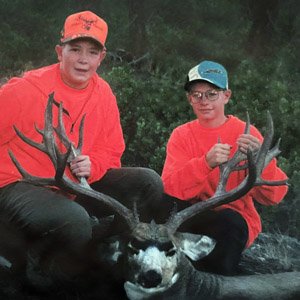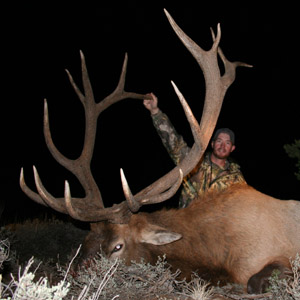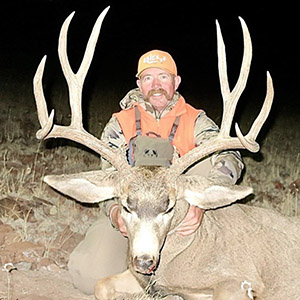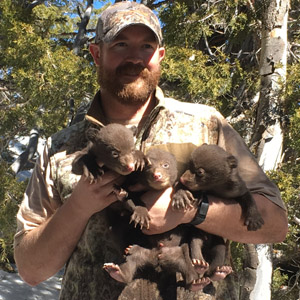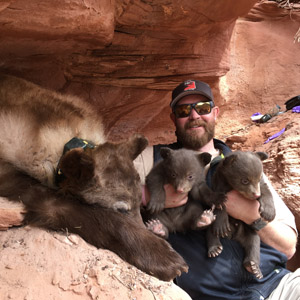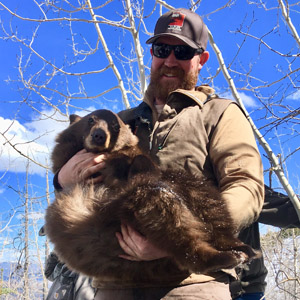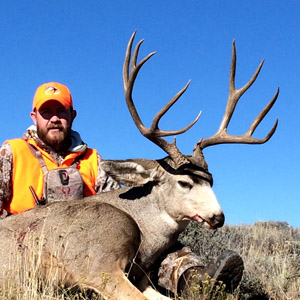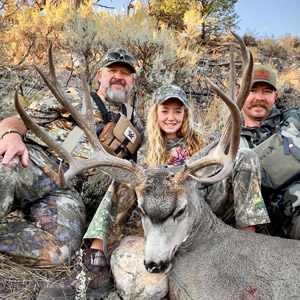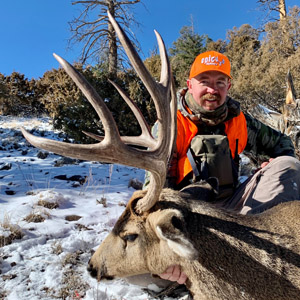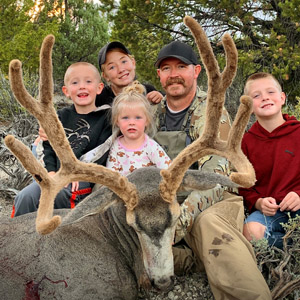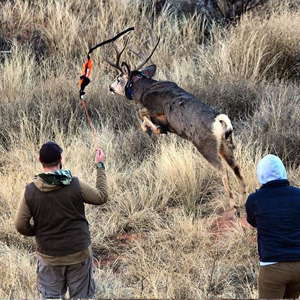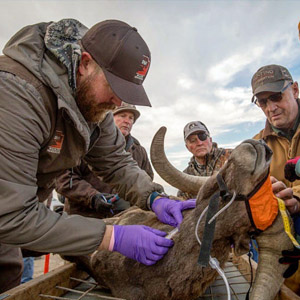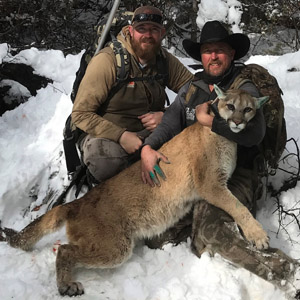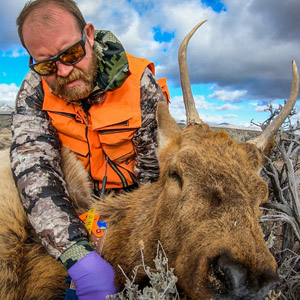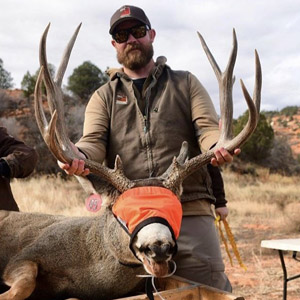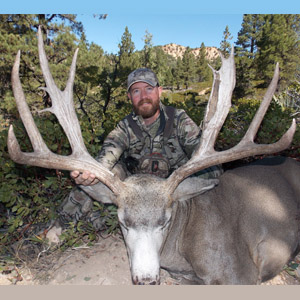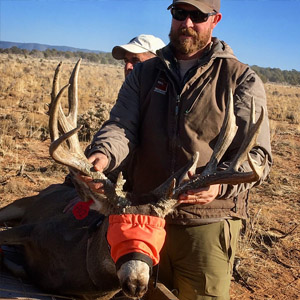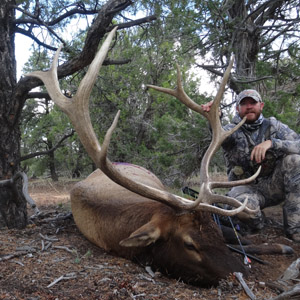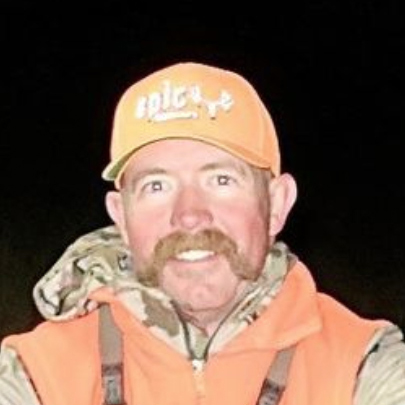
Josh Pollock – Epic Outdoors Staff Member
Growing up in a small southern Utah town made being in the mountains just about an everyday occurrence for me. From the time I was a young child my parents instilled a true love of wildlife and the outdoors in me. As far back as I can remember, my dad would load me up in a backpack and take me in the hills, chasing whatever we could. Our weekly Sunday evening ritual consisted of loading up in the old single cab Dodge and going for rides to look at deer on the famous Paunsaugunt unit. We grew up going with my dad and grandpa fishing, hunting, trapping, shed hunting and any other activity that involved being in the mountains. I could not wait to pass hunter safety so that I could start hunting for myself. When I turned 12, you could find my dad, brothers, and I walking the banks of the Sevier River jump shooting ducks and geese every weekend of the hunt. To be able to finally hunt for myself was a dream come true.
When I was 14, I was offered a job by a local taxidermist helping him with small jobs around his shop. Little did I know that this would plant the seed that started my true hunting obsessions. I could not wait for the fall when hunters would roll though the doors with their trophies. I still get the opportunity to help that taxidermist today, he has not only been a great boss, but is a lifelong friend and mentor to me. I was fortunate enough to accompany him on a grueling Escalante Desert Bighorn sheep unit. This was my first backcountry backpack style hunt. The experience taught me a lot about physical conditioning and mental toughness. Luckily for me, on this trip, I got to watch him kill a great ram. In that moment, I witnessed a grown man fall to his knees in pure relief and enjoyment as he accomplished his lifelong dream of harvesting a trophy sheep. This was one of those moments I will never forget and that taught me a lot about respecting the animals that we pursue.
Another moment in my life that stands out to me is being next to my dad as he harvested the biggest Mule deer I had ever laid my eyes on. When he shot the deer it all happened so quickly that we were not sure how big the deer was until we walked up on it. I remember racing my dad to the deer and the feeling of pulling the 41″ wide 250″ set of antlers out of the manzanita. This started my desire to be a trophy hunter. I knew as I witnessed the holy grail of Mule deer taken that day that harvesting a giant Mule deer was something that I needed to accomplish in my life.
After graduating high school, I attended Utah State University studying biology. While there, I met my wife, who after being accepted into the nursing program, took us back to Cedar City where we both finished our schooling at Southern Utah University. While going to school in southern Utah, I finally drew a coveted Utah elk tag. I had high hopes of killing a giant bull. I knew my odds might be slim as I had decided to go for a late season rifle tag and chase bulls on the winter range. Just before dark, on the fourth evening of the hunt, my dad and I turned up a bull and I made a quick shot as the light was fading. What happened next was like deja vu as we walked up on the giant bull and his antlers emerged from the pinon tree he had piled up in, it felt like hunting with my dad had come full circle as we shared another unforgettable experience on the mountain with my brothers.
I now have children and a goal of mine is to pass my love of hunting and the outdoors on to them. During last year’s hunting season, I learned that passing on these hunting traditions to my children brings some of the greatest joy to my life. I was at my 12 year old daughter’s side as I watched her take an amazing general season deer. Walking up on that deer with her, and seeing the amount of joy she had, once again reaffirmed my love of hunting with my family.
After graduating from Southern Utah University, I was hired by the Utah Division of Wildlife Resources as a Conservation Officer in southern Utah. This was something I had always wanted-a job working around hunting and the outdoors. I enjoyed my time as a Conservation Officer. I loved talking to hunters in the field and seeing them have success as they enjoyed hunting. While working for the Division, I worked closely with biologists from the big game section. Working with wildlife was a passion that provided me with some once-in-a-lifetime experiences. However, I was also exposed to the dark side of hunting, seeing big game killed illegally drove my desires to catch the people that were robbing wildlife from hunters like you and I. Little did I know that although this job gave me plenty of time in the mountains, checking hunting licenses would not satisfy my desire to be hunting for myself.
In 2013, an opportunity came my way to move to the wildlife section and work as a big game biologist. As a bonus, I was able to move back to my hometown and be the biologist that managed the very units I grew up hunting. This biologist district was one of the largest in the state and was responsible for numerous big game species from Mountain goats to Desert Bighorn sheep. I was fortunate to cover units that encompassed some of the best deer and elk units Utah has to offer. From summer classifications, to helicopter surveys in the winter, I learned an extensive amount of information about the areas I managed. From these classifications I would make permit recommendations for the following years hunting seasons. As a biologist, I felt obligated to hunt the areas and the wildlife I managed. Although I spent a lot of time driving the units in the truck, hiking to pick up collars and in a helicopter doing surveys, the value you gain from hunting a unit is just as important as any of those other factors. I wholeheartedly believe that to really know the conditions of a unit, you need to get in there with the wildlife, on their turf, and learn from them. This can only be done correctly by hunting them. I felt like because I was a hunter, I was a better biologist for the areas I covered.
Another learning tool for a biologist is gleaning information from other hunters. A significant responsibility of a biologist consists of consulting hunters about where to apply for hunts and helping them know how to hunt an area successfully after they draw. I loved seeing other hunters succeed; I wanted them to have those unforgettable hunting moments that I had experienced early in my life.
I was fortunate enough to be a biologist in a time where wildlife transplants and GPS tracking collars were just getting going. I cannot begin to count the number of deer, sheep, antelope, and other species I have hauled in a trailer, throughout the state, as we started new populations and augmented others. The thrill of opening the back door of a trailer and seeing a ram jump from the top deck knowing he is going to potentially give someone the opportunity to fulfill their dreams was a serious drive for me to look at every opportunity I could to help populations grow.
While working as a biologist, Utah received funding to start the Utah Migration Initiative. Studying wildlife migrations in the state was needed to better understand proper management of big game. I fought extensively to get as many iridium GPS collars as I could for every species I managed. The big project I wanted to document was the famous Paunsaugunt Mule deer migration. After a lot of persuasion on my part, I was able to convince managers I needed to collar does, fawns and bucks. The things we learned from this migration was pivotal to the management strategies we used moving forward on the unit. This project fueled my passion to learn more about all the species I managed. We collared as many animals as we could, bears, Mountain lions, elk, antelope, sheep and even a stray bobcat here and there. The amount of information gained from these GPS collars was invaluable. One of the most important lessons I learned is: Even when you think you know everything, you don’t. Wildlife will always teach you something new.
Another study I was involved with focused on the abnormal amount of cactus bucks that the Paunsaugunt area holds. For several years we used hunters to help take these bucks off the landscape, and as they did, we studied them extensively. We eventually discovered that a virus was causing these bucks to grow abnormally. Hunters generally do not kill these bucks during the limited-entry seasons, so we were able to start a cactus-buck-only hunt to target these bucks. One of my main goals as a biologist was to create as many hunting opportunities as possible while still maintaining trophy quality.
Through the experiences I had working for the Utah Division of Wildlife, I gained an extensive knowledge of wildlife management and the inner workings of the agencies that maintain the balance between healthy animal populations and healthy harvest. Being a biologist and hunter has given me a unique perspective and rare experiences in the hunting world.
During my time with the division, I got to know Adam Bronson and Jason Carter well. Adam assisted me with a lot of great information as I was working in the same biologist district that he did when he worked for the DWR. Together, they gave me the opportunity to present some of the data we had learned from our studies on the Epic Outdoors Podcast. I gained an immense amount of respect for them. They were passionate in their work, true trophy hunters, and had a lot of knowledge in the hunting industry. Anytime I was around them, they inspired me to do more and be a better person and hunter. I feel like to be successful with hunting, and in life in general, you need to surround yourself with people that build you up and want to make you better. The guys at Epic Outdoors do that for me and are true hard chargers in business and hunting.
I always toyed with the idea of working in the private hunting industry, but was never able to pursue that. When Adam and Jason approached me about working with them, I was blown away and humbled at the opportunity to get into the hunting industry and work for Epic Outdoors. I am extremely blessed and grateful to be able to have the opportunity to work for Epic and have this opportunity to fulfill my dream of working in the hunting industry in this capacity. I look forward to getting to know the Epic Outdoors clients and expand my hunting knowledge and abilities. I am grateful for the opportunity to continue to share this passion of mine as I help members achieve their personal hunting goals and create memorable hunting experiences.
